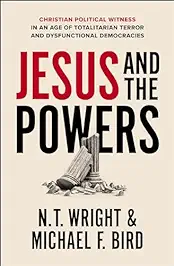 |
| Monroe, In the Country |
I had heard those words a bazillion times before, and they meant nothing to me, functioning at most as a kind of greeting, like "Have a nice day." I awarded them no intellectual assent. But on that day, in that moment, these three beautiful words kick-started a movement in me that has not stilled.
That was my beginning with Jesus. It was not phenomenally the same as what happened to C.S. Lewis, but qualitatively similar. Lewis wrote:
"As the dry bones shook and came together in that dreadful valley of Ezekiel's, so now a philosophical theorem, cerebrally entertained, began to stir and heave and throw off its grave cloths, and stood upright and became a living presence. I was to be allowed to play at philosophy no longer. It might, as I say, still be true that my "Spirit" differed in some way from "the God of popular religion." My Adversary waived the point. It sank into utter unimportance. He would not argue about it. He only said, "I am the Lord"; "I am that I am"; "I am." People who are naturally religious find difficulty in understanding the horror of such a revelation. Amiable agnostics will talk cheerfully about "man's search for God." To me, as I then was, they might as well have talked about the mouse's search for the cat." (From Surprised By Joy)
God found C.S. Lewis, and God found me. I was receptive. I was ready to hear that he existed, and he that loved me.
This did not happen in a vacuum. The soil of my heart had been softening for some time. I had started to look for God. Then, it happened. What shall I make of this?
- If this event had not happened I cannot be sure I would have become a Jesus-follower. It was that important to me. I needed something palpable, tangible, experiential. I don't know if everyone needs such a thing. But I, and Lewis, did.
- The Day of Experience was not only the day God came to me, but it marked the last day of three years of constant drug and alcohol abuse. My pursuits of girls for sex came to a halt,except for one time in the first year as a Jesus-follower where I went back to Egypt and blew it. That failure hit me hard, raising deep questions about who I had become, and what God wanted for me.
- The fact that others in the world religions have religious experiences does not diminish the value of my own. I know, in my study and teaching of comparative religions, that persons in other religions claim religious experiences. I have lines of books on my shelves of comparative religion literature containing testimonies of people of other faiths. I've visited and taught in countries that are predominantly other-religious. But this does nothing to refute the experience I had and, BTW, still have, to the present day. I agree with William James who, in his Varieties of Religious Experience, writes: "A mystical experience is authoritative for the one who experiences it. But a mystical experience that happens to one person need not be authoritative for other people." I'm good with that. (With this exception: the mystical-religious experiences of certain other persons have carried authority with me because of their credibility. For example, my wife Linda has experienced many things, from God, that amaze me.)
- The initial religious experience ripped me out of non-reflective deism, weak agnosticism, and practical atheism into full-blown Christian theism. Historically, this is undoubtable. I now believed in God, and in Jesus. I changed my undergraduate major from music theory to philosophy (fortunately for me the philosophy department at Northern Illinois University was excellent!). I viewed Philosophy as the intellectual agora for addressing and discussing life's Big Questions. I now believed. This experiential belief had an evidential quality for me, and propelled me to go after an understanding of what had happened. Fifty-three years later, this has not stopped. Today I am a deeper believer in God and Jesus than ever.
- I think true religion (not the jeans - they are way too expensive) necessarily includes experience. In my studies of world religions, experience is paramount. Hebrew-Christianity, for example, is essentially about a relationship with God, a mutual indwelling experiential reality. This includes praying-as-dialogue with God, the sense of God's presence, being-led by God, and so on. As well as worship. Worship is experiential and logical in the sense that: If God is love, and God is real, and love is about relationship (love has an "other"), then it follows that one will know and be known by God. ("Know," in Hebrew, means experiential intimacy, not Cartesian subject-object unfamiliarity.) (See Matthew Elliott, Faithful Feelings: Rethinking Emotion in the New Testament.)
- I realize certain atheists claim to have no religious experience at all. John Allen Paulos, for example, in his Irreligion, claims to not have a religious bone in his body. I don't doubt this. This fact does not rationally deter me, just as I am certain C.S. Lewis's religious experiences don't move Paulos from his atheism. (I'm now thinking of Antony Flew's recent conversion from atheism to deism. Flew was moved by the logic of the fine-tuning argument for God's existence. And the case of the famous and brilliant British atheist A.J. Ayer who had a vision and began to be interested in God.)
- I am often taken back to my initial God-encounter. It functions, for me, as a raison d-etre. Philosophically, it's one of a number of "properly basic" experiences I've had, and still have, and may quite well have tonight. See here philosophers like William P. Alston.
- Since that original encounter I've supplemented it with ongoing biblical, theological, and philosophical studies. These are important to me. For example, if I thought that Jesus did not actually exist, I would abandon Christianity. (About ten years ago a teacher at one of our local high schools told his students that Jesus did not actually exist. One of our church kids was in his class. She called me, crying. "The teacher told me that he would consider evidence to the contrary if I could come up with some and bring it to class." I told her: "Why not bring me in?" It happened. I spoke in the high school auditorium to 170 students. The word had spread, and some other teachers allowed me to make my presentation. I spoke for 90 minutes on the actual, historical existence of Jesus. That was so much fun! I had students come to me saying things like, "I saw someone on the internet claim that Jesus never existed, but now I see that their reasoning was wrong." For some stuff I've posted on this go here.)
And that it's not sheerly logical and theoretical, but relational and experiential.
*****
For further reading check out I (Still) Believe: Leading Bible Scholars Share Their Stories of Faith and Scholarship, John Byron and Joel Lohr, eds.








